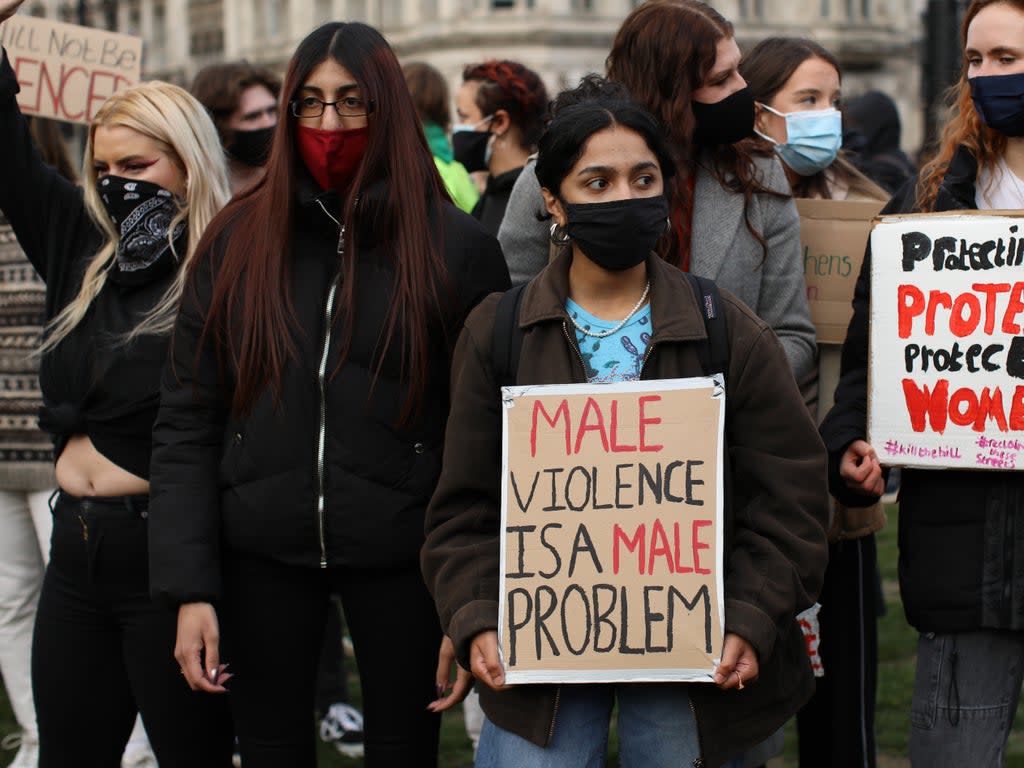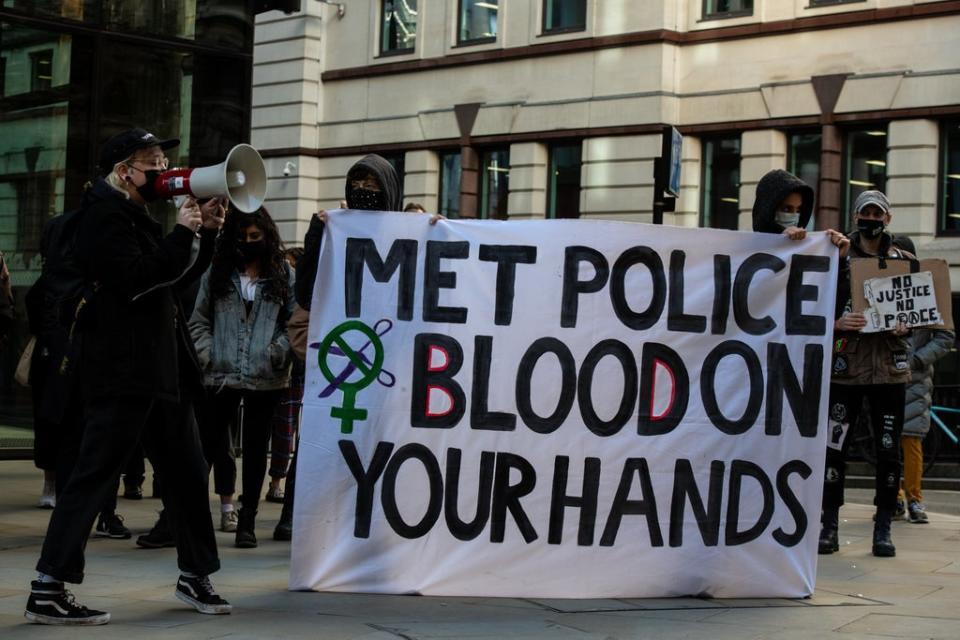The groups to support to help end violence against women and girls

It has not been an easy week for women.
A court heard how police officer Wayne Couzens, 48, used his Metropolitan Police-issued warrant card to kidnap 33-year-old marketing executive Sarah Everard as she walked home from visiting friends in south London on 3 March 2021. Couzens has been given a whole life sentence.
Handing down the sentence today, 30 September, presiding judge Lord Justice Fulford said Couzens had “eroded the confidence that the public are entitled to have in the police” and “considerably added to the sense of insecurity that many having living in our cities, perhaps particularly women, when travelling by themselves”.
In a victim impact statement read to the court on Wednesday, her mother described Everard as “strongly principled” and a good person who “had purpose to her life”.
Elsewhere, a 36-year-old man named Koci Selamaj, appeared in court charged with the murder of 28-year-old school teacher Sabina Nessa, who was killed while walking to meet a friend on 17 September.
And in the US, officials have ruled the death of 22-year-old travel blogger Gabby Petitio – who disappeared while travelling with her fiancé, Brian Laundrie – as a homicide. Laundrie is currently missing and a warrant has been issued for his arrest.
According to Counting Dead Women, a project that tracks femicide in the UK, Nessa is the 107th woman to be killed (or suspected to have been killed) by a man in 2021.
Two more women – Terri Harris and Sukhjeet Uppal – have died since Nessa’s death, with men charged for their murders in both cases.
The deaths of Everard and Nessa, who were walking alone on routes they would have been familiar with, have left women across the country feeling outraged, devastated, scared and hopeless. And their deaths are by no means isolated. A November 2020 report by Femicide Census found that a woman is killed by a man in the UK every three days – a statistic that has remained unchanged for 10 years.
Now, charities and rights groups are calling for structural change against an “epidemic” of violence against women.
Here are some of the key organisations you can support.
Women’s Aid
Women’s Aid is a UK-wide charity working to end domestic violence against women and children.
Some of its core work includes helping ensure that women who come forward about abuse are believed.
Its latest campaign, #DeserveToBeHeard, calls for recognition of the impact that domestic abuse has on the mental health of women and their children.
Today's sentence will never compensate for the degree of the devastation caused. We need to live in a world where no one has to go through this grief. A world where violence against women is destroyed. It is high time we had a whole-system response
➡️https://t.co/W5TTnFXmOx pic.twitter.com/qhzYuC7U1K— Women's Aid (@womensaid) September 30, 2021
Following the sentencing of Wayne Couzens, the group has urged the police to embark on an “urgent programme of restorative work” to regain the confidence of women.
Farah Nazeer, chief executive of Women’s Aid, said there needs to be institutional and systemic change.
She called on police forces to work with specialist organisations, like themselves, to “ensure that all police staff are trained adequately to improve the response given to all women who have experienced violence and domestic abuse”.
“This would also address some of the deep-seated inequalities and sexist attitudes that still exist across so many police forces,” she said.
Donate to Women’s Aid here.
Sisters Uncut
Sisters Uncut, a feminist direct action group that campaigns for the improvement of domestic and sexual violence services, have called for an end to police violence.
On Wednesday, the group staged a protest outside London’s Old Bailey, where Couzens was sentenced.
In its call to action, Sisters Uncut has asked the public to support its campaign against the Police, Crime, Sentencing and Courts Bill, arguing that it increases police power.

It has also announced a new series of “Police Intervention training” which will educate the public on their rights when stopped by police.
Speaking on Wednesday, a member of Sisters Uncut said: “Today we learned that Wayne Couzens ‘arrested’ Sarah. He used his power as a police officer to kidnap and rape her. We will never know what might have happened if somebody had stopped to film or intervene with Couzens when he ‘arrested’ Sarah.
“We do know that the police cannot be given more powers. Couzens was not one bad apple – it’s the whole institution that is rotten. We must resist the Policing Crime, Sentencing and Courts Bill, and we must work together to resist the police on our streets.”
Learn more about how you can support Sisters Uncut here.
Reclaim These Streets
Reclaim These Streets is campaigning for safer public spaces, arguing that streets should be safe for women regardless of what they are wearing, where they are going, or at what time of day or night they are travelling.
The group said it is wrong that “the response to violence against women required women to behave differently”.
This is the only appropriate sentence for such an abhorrent crime with abuse of power at its core. He was a serving Met police officer. We are so sorry for Sarah's family and loved ones because nothing, not even a life sentence, can ever bring her back.
— Reclaim These Streets (@ReclaimTS) September 30, 2021
Following Everard’s murder, the group has been campaigning to raise awareness of an “epidemic” of violence against women.
“Let all loudly say that women are not the problem. They never have been.
“The burden that society places on us to keep safe is put there to distract us from the fact that until we demand that male violence is treated like the epidemic that is, we will never be safe,” it said in a statement on Wednesday.
Learn more about how you can support Reclaim These Streets here.
End Violence Against Women Coalition (EVAWC)
This is a coalition of specialist women’s support services, researchers, activists and survivors.
The coalition has built refuges for women and children needing to flee violent men and created woman-centred rape counselling services.
Their work also recognises the different dynamics of abuse that women from different backgrounds face. They have employed women from ethnic minority backgrounds to create services specifically tailored to these groups.
EVAWC said Couzens’ sentence won’t leave women feeling less afraid.
It said that “attitudes and gendered norms that underpin and normalise all forms of male violence” must be tackled.
“[Justice] means investment and research into prevention work, and criminal justice and political leaders who genuinely prioritise tackling violence against women and girls to bring about meaningful change,” a statement said.
“Violence against women and girls exists on a continuum, Couzens engaged in other forms of abuse in the lead up to murdering Everard.
“The connections between so-called ‘lower-level offending’ and the escalation to other harms must be further explored if we are to end and prevent violence against women,” it added.
Donate to EVAWC here.
The Centre for Women’s Justice
The Centre for Women’s Justice is a group of lawyers and academics who work to hold the government to account, and challenge discrimination against women in the justice system.
The centre identifies failures in the prevention of violence against women and monitors trends in policy and the law which are further spurring the issue.
In 2019, the group submitted its first police super-complaint. The report highlighted how four different types of measures designed to protect victims of domestic abuse were being used poorly in many policing areas.
In a new statement following Couzens’ sentencing, the group said it has been in contact with more than 150 women who have come forward and alleged that they were victims of police abuse in the last 18 months.
“Many women are fearful of reporting such crimes because they cannot trust the police to investigate.
“Where they do report, they are frequently failed and sometimes victimised by other officers loyal to their accused colleague.
“All police forces should operate a zero-tolerance approach to police perpetrators of all forms of abuse including to the boys’ locker room culture within police forces and, institute a robust, transparent and independent process for investigating and dealing with allegations of police perpetrated abuse,” the group said.
Donate to the Centre for Women’s Justice here.
Making Herstory
Making Herstory is a UK-based charity working to end the abuse, enslavement and trafficking of women and girls.
The charity undertakes various projects, including education programmes with schools and local councils.
It also provides emergency aid and essential items for survivors and supports shelters for women and their children.
Additionally, it is lobbying for policy change to better protect women and girls from violence. This includes a campaign to introduce a “national stalker register”.
According to the charity, between 2015-2017, 55 women were murdered by their stalkers, despite having made detailed reports of their fears to the police or courts.
Although stalking is a criminal offence, there is currently no existing framework to track or monitor stalkers.
After it emerged that Couzens kidnapped Everard in a fake “arrest”, the charity has called on the Metropolitan Police force to change its policies.
“From here on out, No male police officer should be permitted to arrest a woman without a second officer on site. That’s the change that needs to be made permanently. And needs to be made NOW,” a statement said.
Donate to Making Herstory here.
Women’s Equality Party
The Women’s Equality Party is a feminist political party that was established in 2015.
The party is pushing for equal representation of women in all aspects of society, including politics, business and industry. Its manifesto aims to tackle existing imbalances, such as the pay gap.
It also recognises physical and sexual violence against women as a public health problem.
Following the sentencing of Couzens, the deputy leader of the party, Tabitha Morton, called for an independent inquiry into misogyny in the police.
She told The Independent there had been “missed opportunities for the Met to identify the danger Couzens posed before he used his police powers to arrest Sarah and murder her”.
She said it was past time to look at the ways the policing system enables violence against women.
“The sentencing today of Wayne Couzens must be the beginning of the end of violence against women and girls because this is not only about one man, one murderer in the police.
“It is also about the culture of the police that allows misogyny and sexism to go unchallenged that is part of what has brought us here.
“The Women’s Equality Party is calling for an independent inquiry into misogyny in the police, and for violence against women and girls to be treated as a national threat - like terrorism. It is only with real political action that we can start ending violence against women and girls, rather than managing it,” she said.
Learn more about how you can support the Women’s Equality Party here.
Read More
Everything we know about murder of primary school teacher Sabina Nessa
Missing teacher’s body discovered by dog walker
School ‘devastated’ after teacher Sabina Nessa named as murder victim
Everard case shows allegations of violence against police are ‘not taken seriously’
Chrissy Teigen commemorates losing her son Jack one year on
Belgium is first country to fund abortions for Polish women facing near-total ban

